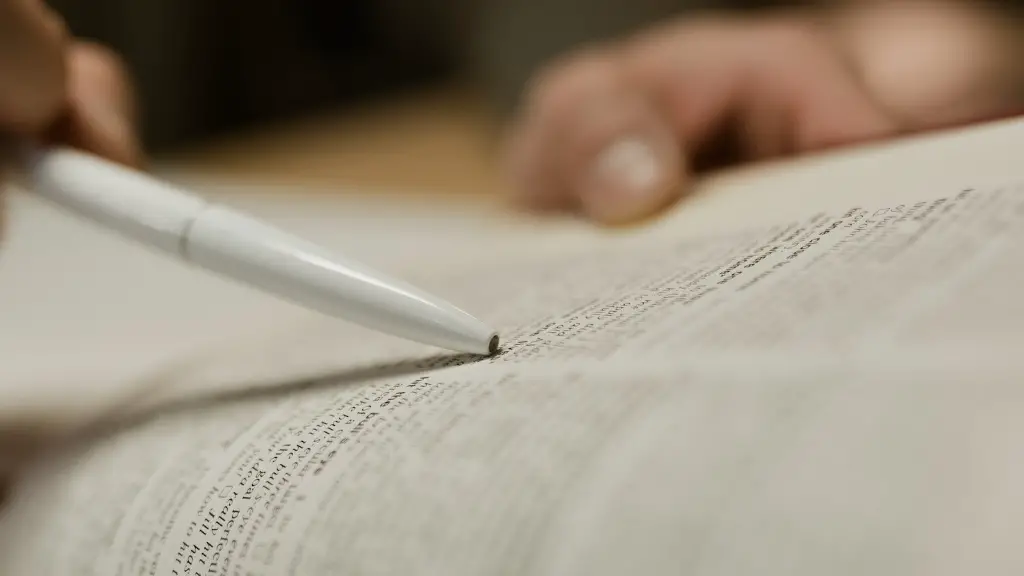How to Write Elegy Poetry
Elegy is a poetic form of elegiac writing, traditionally used to lament the dead. It is most commonly associated with grief and mourning for a lost loved one. Although the elegy has been employed since ancient Greek times, it still remains popular today. Writing an elegy is a unique and personal experience, as it allows the poet to express their own feelings of sorrow and grief toward an individual or event. Here’s a guide on how to write an elegy poem that will be meaningful and emotionally resonant.
Understand the Elements of Elegy Poetry
Though elegy often takes on a somber tone, it is much more than a vehicle of expressing grief and sorrow. To write a successful elegy poem, you must understand the elements of the form. Elegy is a lyric poem that mourns the death of an individual or the passing of a particular era. It usually addresses themes of mortality, mortality being a longstanding theme in elegy poetry. Common elements of elegiac writing include strong emotion, vivid imagery, personification, apostrophe (addressing a non-existent/absent being), and a focus on reminiscence and memorialization.
In addition to understanding the form of elegy, it is important to consider the different poetic conventions of the form. These include the classical Greek structure, the English “Poulian” form, and the modern “meditation” format. Each of these conventions has its own unique set of characteristics and can help bring out different styles and approaches in your poem.
Start Collecting
When you begin to write your elegy poem, it is important to start collecting your thoughts and feelings. The best way to begin is to write down whatever thoughts or emotions come to mind. In the process, certain ideas or images may emerge that will serve as the foundation of your poem. Taking the time to collect these ideas will help you create an eloquent, resonant poem.
As you collect your thoughts, it is important to take note of the emotions that you are feeling. A successful elegy poem should be an honest expression of your emotions and should be able to evoke an emotional response in the reader. Keeping a journal of your thoughts or collecting certain symbols or items that have significance to the individual or event you are memorializing can be a great way to channel your emotions and to help create an emotionally resonant poem.
Start Creating
Once you have collected your thoughts and feelings, it is time to start creating your poem. Begin by outlining your poem, sketching out the different ideas and emotions you wish to express. This will help you craft the flow of your poem, ensuring that it clearly and succinctly conveys your emotional message. As you write, ensure that you use vivid imagery and powerful language that accurately conveys the emotions you are feeling.
It is also important to consider the different poetic conventions of the form, as this will help bring out different styles and approaches in your poem. For example, classical Greek structure utilizes a three-part structure—an invocation, a remembrance of the deceased, and a section for the poet’s own reflections. English “Poulian” form focuses on the deceased’s life and deeds and typically follows a “shower of blessings” structure. Finally, the modern “meditation” format is a more lyrical and emotionally open structure, with a focus on death and mortality.
The Value of Revision
Once you have written your poem, it is important to revise it to ensure that it accurately conveys your intended message. This is an important step in the writing process and can be the difference between an effective poem and an ineffective one. Revising your poem can help to ensure that it is emotionally resonant and that it properly conveys the grief or sorrow that you are feeling.
Revision can also help to refine the poem’s structure, refine its language, and eliminate redundancies or inappropriate language. Taking the time to read and analyze your poem multiple times can help to make sure that it is as effective as it can be. Additionally, getting feedback from friends and mentors can also be a great way to refine your poem and make sure it has the intended emotional resonance.
Reconsider Elegy in contemporary contexts
As noted earlier, the elegy has a long history and remains a popular form of writing today. Although traditional elegiac writing primarily focused on death and mourning for the departed, the elegy can also be used to reflect on current events. For example, elegies can be used to capture and convey the emotion of such moments as the Boston Marathon bombing in 2013 or the passing of Nelson Mandela in 2013. Using the same conventions of traditional elegy can help to ensure that these poems have a truly emotional resonance.
The elegy can also be utilized to explore contemporary issues, such as the current state of race relations in America or the ongoing debate over climate change. Utilizing classical and modern elements of elegy can help to create powerful pieces of poetic writing that accurately reflect the emotional nuances and complexities of contemporary issues.
Explore Metaphor and Simile
When it comes to writing an elegy, exploring metaphor and simile are great ways to add depth and resonance to your poem. Metaphors and similes help to transform abstract concepts into concrete imagery and can be a great tool for conveying emotions. For example, using a metaphor such as “the world is a withering flower” can help to illustrate the idea of change, mortality, and loss in a powerful and emotive way.
When using metaphor and simile in your elegy, it is important to ensure that they are used in moderation and that they are appropriate to the context. This can help to ensure that they accurately reflect the emotional elements and nuances of your poem.
Utilize Rhyme and Meter
Rhyme and meter are essential elements of many poetic forms, including elegiac writing. Utilizing rhyme and meter can be a great way to ensure that your poem has a consistent rhythm and flow and to ensure that it resonates with the reader. Many elegy poems are written in the elegiac couplet, a type of rhyme scheme involving two successive rhyming lines. Additionally, using sonnets or iambic pentameter can help to create a powerful sense of rhythm and flow within the poem that increases its emotional power.
However, it is important to remember that utilizing rhyme and meter are not essential elements of elegy poetry and can be used in moderation. Striking the right balance between traditional structure and modern form can help to ensure that your poem is both resonant and meaningful.
Exploring Grief Through Elegy
Elegy is a powerful tool for exploring grief, sorrow, and mortality. Writing an elegy can help to express and process emotions in a way that can be truly meaningful and emotionally resonant. Taking the time to understand elements of the form and to create a poem that captures your emotions in an eloquent and honest way can help to ensure that your poem touches the reader in a powerful and profound way.
Exploring Historical Contexts Through Elegy
Elegies can also be a great tool for exploring historical events and figures. Since traditional elegiac writing often centers around death, loss, and mourning, it can be a great way to explore the impact of historical events and figures upon society. Utilizing the traditional conventions of elegy, such as the use of metaphor, simile, and apostrophe, can be a great way to explore the emotions and complexities of certain historical events or figures.
At the same time, modern “meditation” style elegies can also be used to bring a fresh perspective to historical events and figures. This style of elegy focuses on death and mortality and can be used to explore the deeper significance of historical figures. Taking the time to consider the impact of certain individuals on society can help to create powerful elegies that can resonate with readers.
Conclusion and Summary
Although the elegy has been around for centuries, it still remains a powerful and meaningful form of poetic writing. Exploring the traditional conventions of the form and using modern approaches and techniques can help to ensure that your poem is emotionally resonant and that it accurately conveys your feelings and emotions. Writing an elegy can be a unique and personal experience, allowing you to express your own feelings of sorrow, grief, and mortality.




